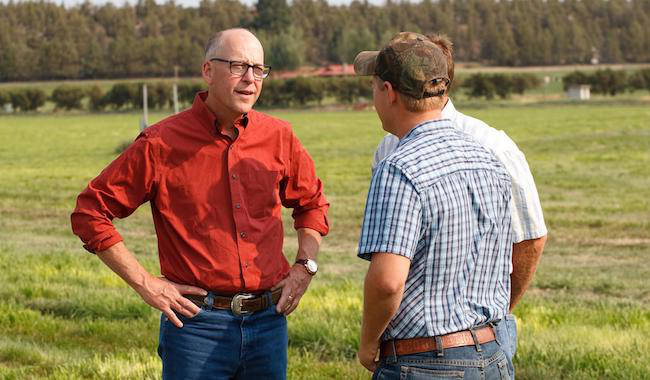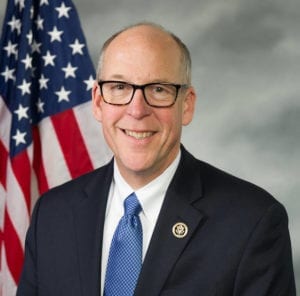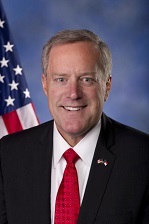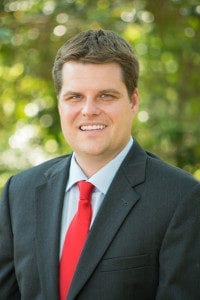Rep. Greg Walden (left) is the ranking Republican on the House Energy and Commerce Committee and is calling for climate solutions.
More Republicans are talking about climate solutions, and that’s a good thing
By Steve Valk
On climate change, the conversation in Congress has taken a decidedly positive turn: Democrats in the House majority are pushing the issue high on the chamber’s agenda, and more and more Republicans are acknowledging the threat of human-caused climate change and saying this is a problem that must be dealt with.
One of the Republicans who spoke up early this year is Rep. Greg Walden from Oregon. Walden, the ranking member of the Energy and Commerce Committee, opened a February hearing on climate change by saying, “Climate change is real. The need to protect the environment is real. The need to foster a strong U.S. economy and grow American jobs is real. And the need to prepare our communities for the future is real. The Republicans on this committee are ready and willing to have serious, solutions-oriented discussions about how to address and balance these considerations.”
Positive shifts in tone and message
This may not seem like a radical departure, but such statements from Republicans were few and far between in previous Congresses.
“Yes, there has been a change in that [Walden] seems willing to talk about [climate],” said Helen Seidler, speaking on behalf of a group of Citizens’ Climate Lobby volunteers in Bend and Medford, Oregon. “For example, he led off recent town halls in Bend and Medford with comments on climate.”
CCL volunteer Sherrill Rinehart was at one of those town halls and asked Walden what he thought about the Energy Innovation and Carbon Dividend Act. Seidler says, “He asked a lot of basic questions, like how much would the fee be for the first year and what was the number of the original bill introduced in last year’s Congress.”
While Walden was never openly dismissive of climate change, it is not an issue he previously drew attention to. Now, the conversation is clearly underway.
More voices joining the conversation
“I can’t think of an occupation where words matter more than in politics,” says Dr. Danny Richter, CCL’s Vice President of Government Affairs, so it’s especially meaningful when Republicans make comments like Walden’s about the need to find solutions to climate change. “Let’s take them at their word, and have their constituents hold them to it. Let’s engage in a respectful and appreciative discussion.”
Will comments like Walden’s help open the door to more productive, specific policy discussions than Congress has had in the past? It certainly seems so.
Just this week, Republican Mark Meadows of North Carolina said in a congressional hearing, “I have people on my staff that are looking at carbon tax and a number of issues.” E&E News has described Rep. Meadows as a “Trump ally and staunch conservative.”
And last week, Florida Republican Rep. Matt Gaetz introduced a resolution called the Green Real Deal—his answer to Alexandria Ocasio-Cortez’s Green New Deal on the other side of the aisle. The resolution did not lay out emissions reductions targets or policy specifics, but it was nevertheless an important climate message from yet another conservative. Gaetz said, “History will judge harshly my Republican colleagues who deny the science of climate change. I didn’t come to Congress to argue with a thermometer.”
He told reporters, “You should ask every Republican whether or not they believe in the science of climate change. And if Republicans do believe the climate is changing, it’s incumbent upon each and every one of them to support a solution, not to merely acknowledge the problem and stay with their head stuck in the sand.” The message here from Gaetz is clear: climate change is real, and we need to act.
Influencing colleagues and constituents
Comments like these from Gaetz, a frequent cable news guest, are an important “elite cue.” Meadows’ and Walden’s statements are too. Elite cues are behaviors or opinions expressed by knowledgeable or powerful individuals, typically conveyed by the media, that the general public listens to. Our February 2018 speaker discussed these, and also identified party platforms and positions taken by politicians, such as on climate, as common cues.
In CCL, our staff and volunteers have always held space for members of Congress to evolve: to learn more about the climate issue, to understand how it relates to their values, and to take steps forward. As we move deeper into this new Congress, we hope to see—and help—this kind of evolution spread.
Even if members haven’t “gotten it right” on climate change in the past, some are beginning to, and they’re sending those elite cues to their colleagues and their constituents. That, in turn, creates more agreement and leads us closer to passage of the Energy Innovation Act.
The post More Republicans are talking about climate solutions, and that’s a good thing appeared first on Citizens' Climate Lobby. |





